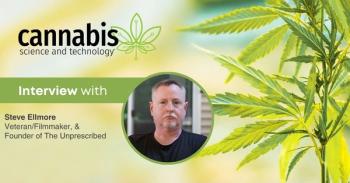
- March/April 2022
- Volume 3
- Issue 1
- Pages: 33-35
Chronic Pain Advocacy: It’s Time to Testify!
Nurse Practitioner Me Fuimaono-Poe discusses how becoming an advocate and assisting with legislation are the best tools to help your state, community, and yourself gain access to cannabis and help others.
Chronic pain is a condition that is not easily diagnosed. Cannabis Patient Care’s Editorial Advisory Board (EAB) member, Me Fuimaono-Poe, Nurse Practitioner (NP), has spent her adult life aggressively fighting for cannabis’s chance to be seen as a medical tool for various health ailments such as chronic pain and many other conditions. In this article, she discusses how becoming an advocate and assisting with legislation are the best tools to help your state, your community, and yourself gain access to cannabis and help others with a better quality of life.
When you think of pain, you think of it as something that is temporary and a fleeting emotion. Pain can be acute and eventually go away or it can be chronic where the patient suffers with it indefinitely. Chronic pain is one of the costliest health ailments in the US (1). Aside from its wear and tear on the body, chronic pain comes with increased medical payments, lost income, lost productivity, and worse. One of the most common treatment plans for this illness is prescription medications, such as opiates and opioids. Often, these drugs can lead to abuse because of their addictive qualities and can cause negative outcomes.
Opioid users are now exploring more natural alternatives to treat their chronic pain. One holistic option chronic pain patients have been turning to is medical cannabis, which has helped treat their chronic conditions without the addictive properties and undesirable side effects. Cannabis has been shrouded and stigmatized by the “stoner’s high” image. Although the industry is evolving, not all medical health practitioners and state legislations allow for medical cannabis to be used as health treatment options. Me Fuimaono-Poe, is a nurse practitioner (NP) who has spent her adult life aggressively fighting for cannabis’s chance to be seen as a medical tool.
Early Career
Fuimaono-Poe began her career in healthcare as a bedside nurse in an oncology department in California. She explained that it was soul-crushing to witness cancer patients suffer from the strong side effects of chemotherapy day after day. In the hospital, patients weren’t allowed to be prescribed medical cannabis. Although it was not medically recommended, patients were able to have time outside where they could consume their cannabis of choice. Whatever product they chose to consume, had to be supplied by them or a family member or friend, but it could never be supplied from the healthcare facility. Fuimaono-Poe found it odd that they would support the plant in a small way that often showed phenomenal results in their patients but not advocate for it. Healthcare continued to focus on the negative image rather than the good of the patient. Oncology patients couldn’t eat or have energy to be productive from all the nausea and fatigue. When a patient used cannabis, they would have more energy and be interested in eating a little bit of food.
A Passion for Advocacy
Eventually, Fuimaono-Poe moved from California to Hawaii where she became a nurse practitioner (NP). In 2016, the state of Hawaii passed legislation allowing nurse practitioners to be able to certify patients for cannabis use. With this law, Fuimaono-Poe opened the first nurse practitioner-lead cannabis clinic in the state of Hawaii (2). Fuimaono-Poe explained that she opened her clinic with one goal in mind and that was to provide access to the plant and to keep people out of jail. “With that in mind, with that being the base of how we opened, we’ve always had a very strong advocacy presence,” she said. “The first year that we opened up, we got the Democratic Party to host a cannabis town hall where we got Tulsi Gabbard to speak. That was when she was just a representative here in Hawaii.”
Advocacy had always been in her blood from when she was younger, but here she blossomed into a true cannabis advocate. In 2018, legislation was written to list opiate use disorder as an illness to be treated with medical cannabis (3). Unfortunately, the governor of Hawaii vetoed the bill. One year later, in 2019, Fuimaono-Poe petitioned to the state—the Department of Health—to allow it. She put in hours and hours of reading and writing to create the petition and while she was researching, Fuimaono-Poe ended up learning more about opiate use disorder and cannabis. She found a 2018 study that was published by the Journal of American Medicine Association (JAMA) detailing how when medical cannabis was available, prescriptions for opiates decreased by about 6% (4). Additional data in the study displayed a decrease in opiate deaths by 24–25%. “This was huge because I was like, ‘Oh my gosh, why isn’t everybody doing this? Why isn’t everybody talking about this?’,” Fuimaono-Poe said. She added that this information led her to focus on how medical cannabis can be a tool to decrease opiate use.
Another thing that Fuimaono-Poe and her team are working towards legislatively is allowing providers to not have to cite a qualifying condition and instead use their best judgment when treating a patient. She added that the rules that exist in Hawaii (and throughout the US) for medical cannabis don’t exist with any other types of medications.
Advocacy Advice
Fuimaono-Poe's biggest advice for those interested in seeing change in the cannabis industry is to advocate. “It’s like— it’s so cheesy, we watched Spiderman and Uncle Ben, well, you know how Uncle Ben, one of his scenes was where he mentioned ‘with great power comes great responsibility.’ I honestly feel that anybody that is in this cannabis space, if you are not an advocate, you better get busy and get on it, because it’s our responsibility,” she said. “If you’ve touched this plant and it’s helped you, if you work with this plant, if you make money from this plant, and you are not advocating for complete freedom of this plant, that’s disappointing to me. I think that being an advocate is not that hard, it’s just showing up—that is the most important part.”
One method Fuimaono-Poe uses to advocate for cannabis is by creating a post, putting in links to testify, and then physically showing up to testify for the cause. It’s just a couple of steps to take some time out of your life, but Fuimaono-Poe has witnessed first-hand the importance of the impact it has.
The haze surrounding cannabis is dissipating because of the hard work being done by advocates to help change the plant's value and cultural image. When California passed Proposition 64 (Prop 64), adult-use cannabis came on the scene. Unfortunately, it devastated the craft cannabis market which had helped put California on the map (5,6). The small businesses that survived are now being taxed out to where farmers are taxed when they’re selling cannabis and to dispensaries. Fuimaono-Poe believes that every hand that touches cannabis is paying high taxes. As the industry continues to change and expand, she would like to see federal decriminalization, but in a way that doesn’t create or make it more burdensome for craft cannabis businesses, users, and others.
“They’re calling it the second war on drugs with these adult use states to where it’s so hard to be in compliance. That when people are out of compliance, then they’re re-criminalized,” said Fuimaono-Poe. “I think creating cannabis rules and regulations that aren’t a burden and having a low tax are necessary, because at the end of the day, you’re looking at a medicine.”
Cannabis isn’t a tool to be abused; it has true potential to be a tool to treat various health ailments and diseases. There are many individuals who would like to help people gain more access to cannabis, but it is very difficult to start a business or to obtain products for treatment when the cannabis industry is so heavily taxed. The landscape needs to become more open to small businesses and minority communities rather than big conglomerate entities.
If you want to see change, you need to be the change. To begin your advocacy journey, Fuimaono-Poe highly recommends meeting and organizing with like-minded people as the first step. Once you’ve joined a group of people who share similar values and initiatives as you, it’s time to register with your legislature and you can select topics or keywords that pertain to your interests such as, cannabis, marijuana, and so on. Your legislature will then send you bills you can search through and find the ones that you support. One of the reasons Fuimaono-Poe recommends finding a group or multiple groups, is that they help filter through and pull out the bills everyone is passionate about. When the time comes for that bill to be discussed, the most important step is to show up and testify!
“I think that people don’t understand their impact. By simply doing something like recording your testimony, sharing it—because another thing I don’t think people understand is that typically when you’re testifying on a bill, it’s not just like one time and it’s done,” said Fuimaono-Poe. “Typically, that bill will have several moments for testimony because that must go through all of these different committees. Say it’s in a health committee, you testify, and you post it, and you post links, then people can testify when it’s in the Judiciary Committee.”
Find the causes that mean the most to you. Take these steps: sign up for alerts, find bills that you want to support, share it on social media, and testify at the legislature level. Those are the steps you need to take to become an advocate.
It may seem a bit overwhelming to enter the political arena but, if you want to see change, sitting in the backseat isn’t the best approach to make it happen. Other advocates need your help to make a difference and to help tackle the stigma attached to cannabis. Being a Schedule I drug prevents the medicinal plant from being seen as anything other than a recreational high, as well as many politicians and anti-drug supporters viewing the plant with caution. Through advocacy, cannabis has the opportunity to help millions of people with their health conditions, but it needs people to be there to stand up for it and have its back. By joining others with similar goals as yourself, you will not be alone and will be able to accomplish so much more. It’ll create a united front and give you the tools to shift things around in the cannabis industry. Advocates are out there waiting for you, so get out there and testify for more access to cannabis and to change the legal landscape!
References
https://www.hopkinsmedicine.org/health/conditions-and-diseases/chronic-pain .https://www.maliecannabisclinic.com .https://www.capitol.hawaii.gov/session2018/bills/HB1893_.HTM .- A.C. Bradford, W. David Bradford, A. Abraham, PhD1, et al., JAMA Intern Med.178(5), 667-672. doi:10.1001/jamainternmed.2018.0266 (2018).
https://post.ca.gov/proposition-64-the-control-regulate-and-tax-adult-use-of-marijuana-act .https://www.courts.ca.gov/prop64.htm .
Articles in this issue
over 3 years ago
March/April 2022 Digital Editionover 3 years ago
Chronic Pain: Data Snapshotover 3 years ago
Overview of Research on Cannabis for Chronic Painover 3 years ago
Finding Relief with Cannabisover 3 years ago
Eyewitness: Cannabis Should Be the Chronic Pain Treatment ChoiceNewsletter
Unlock the latest breakthroughs in cannabis science—subscribe now to get expert insights, research, and industry updates delivered to your inbox.




